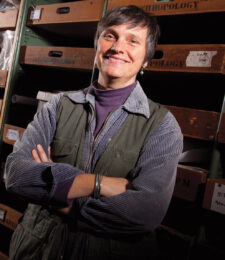Campus: Milwaukee
Availability: Fall, Spring
Method: In Person, Virtual
Bettina Arnold
Professor
College of Letters & Science
Current Faculty or Staff Member
Bettina Arnold obtained her BA in Archaeology from Yale University and her MA/PhD degrees in Anthropology from Harvard University. She is a Full Professor of Anthropology at the University of Wisconsin-Milwaukee and Adjunct Curator of European Archaeology at the Milwaukee Public Museum. Her research interests include European prehistory with an emphasis on the pre-Roman Iron Age, the archaeological interpretation and analysis of complex societies, particularly as reflected in mortuary contexts; material culture as a symbolic system and a means of communicating social relationships; the role of alcohol and its consumption in establishing and maintaining social systems in prehistoric and historic societies; the archaeological interpretation of prehistoric gender configurations; and the socio-political history of archaeology, particularly its role in identity construction in 19th and 20th century nationalist and ethnic movements in Europe and the United States.
Selected publications:
2023 The perils of a usable past: archaeology’s journey from culture history to culture wars. Getty-CAS Spring School Working Paper Series 13/1 The Impact of the Political on Archaeological Research, pp. 1-22. University of Sofia, Bulgaria. https://www.ceeol.com/search/journal-detail?id=659
2022 “If you brew it, they will come”: Experimental archaeology, ancient alcohol and museums. In: Valamoti SM, Dimoula A, Ntinou M (eds) 2022, Cooking with Plants in Ancient Europe and Beyond: Interdisciplinary approaches to the archaeology of plant foods, pp. 493-504. Leiden: Sidestone Press.
2022 National Socialist archaeology as a Faustian bargain: the contrasting careers of Hans Reinerth and Herbert Jankuhn. In Bernard M. Levinson and Robert P. Ericksen (eds) Betrayal of the Humanities under National Socialism, pp. 332- 357. Bloomington, IN: Indiana University Press. https://iupress.org/9780253060792/the-betrayal-of-the-humanities/
2021 “And make some other man our King”: mortuary evidence for labile elite power structures in early Iron Age Europe. In Tim Thurston and Manuel Fernández-Götz (eds) Power from Below in Premodern Societies: The Dynamics of Political Complexity in the Archaeological Record, pp. 106-124. Cambridge: Cambridge University Press.
2021 “Man the hunter and field archaeologist vs. woman the gatherer and laboratory analyst”, pp. 14-15; and “Men were active producers of tools, art and innovation, while women were passive home-bound breeders”, pp. 10-11. In: Laura Coltofean-Arizancu, Bisserka Gaydarska and Uroš Matić (eds) Gender Stereotypes in Archaeology. A Short Reflection in Image and Text. Leiden, Sidestone Press. https://www.sidestone.com/books/gender-stereotypes-in-archaeology
2020 Intersectionality and elite identity in Iron Age west-central European mortuary contexts. In Patrice Brun, Bruno Chaume and Federica Sacchetti (eds) Vix et le Phenomene Princier. Colloque international de Châtillon-sur-Seine, France, pp. 299-309. Préhistoires de la Méditerranée. Una Éditions, Bordeaux.
2019 Internal conflict in Iron Age Europe: methodological challenges and possible scenarios. With Manuel Fernández-Götz. World Archaeology 51(5): 654-672.
DOI: 10.1080/00438243.2020.1723682
2019 A landscape of ancestors — looking back and thinking forward. With Matthew L. Murray. In Celeste Ray and Manuel Fernández-Götz (eds) Historical Ecologies and Complex Societies: Festschrift for Carole Crumley, pp. 235-247. New York: Routledge/Taylor & Francis.
2019 “Der stete Antiquar“: William Frankfurth (1829-1891) aus Milwaukee, WI, USA. In: Günther Kaufmann and Andreas Putzer (eds) Die Anfänge der Archäologie im Süden Tirols: Forschungsgeschichte bis 1919, pp. 289-300. Bolzano: Südtiroler Archäologiemuseum.
2019 Expect the unexpected: implications of recent analyses of mortuary vessels for early Iron Age social configurations and commensality in southwest Germany. In Philipp Stockhammer and Janine Fries-Knoblach (eds), Was Tranken die frühen Kelten? Bedeutungen und Funktionen mediterraner Importgefäße im früheisenzeitlichen Mitteleuropa, pp. 213-230. Leiden: Sidestone Press.
2018 Agency in architectural choice: the Heuneburg hillfort as monument and metaphor. With Manuel Fernández-Götz. Understanding Ancient Fortifications: Between Regionality and Connectivity, Ariane Ballmer, Manuel Fernández-Götz and Dirk P. Mielke (eds), pp. 147-156. Oxford: Oxbow.
2017 The grave’s a not-so-private place: elite multiple burials in early Iron Age west-central Europe. With Manuel Fernández-Götz. Germania 95: 181-198.
http://journals.ub.uni-heidelberg.de/index.php/germania/index
2016 Two Hallstatt burial mounds in the Hohmichele group in the ‘Speckhau’. With Matthew L. Murray. In D. Krausse, M. Fernández-Götz, L. Hansen and I. Kretschmer, The Heuneburg and the Early Iron Age Princely Seats: First Towns North of the Alps, pp. 121-127. Budapest: Archaeolingua.
2016 Belts vs. blades: the binary bind in Iron Age southwest German mortuary contexts. In “Binary Bind”: Deconstructing Sex and Gender Dichotomies in Archaeological Practice, edited by Lara Ghisleni, Alexis Jordan & Emily Fioccoprile. Special Issue of the Journal of Archaeological
Method and Theory 23(3): 832-853. http://link.springer.com/article/10.1007/s10816-016-9289-8.
